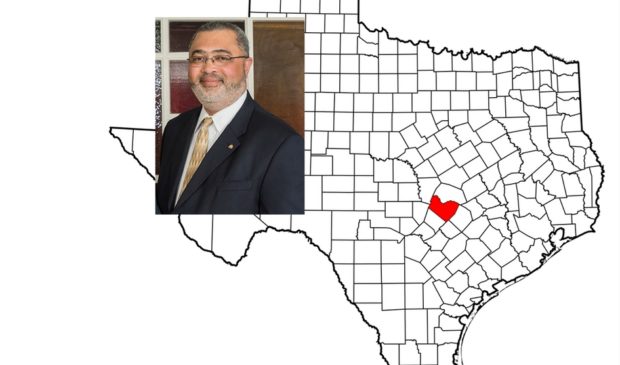Travillion’s first year set a brisk pace for continued advocacy
Tuesday, December 26, 2017 by
Caleb Pritchard Travis County Commissioner Jeff Travillion hit the ground running in his first year as the representative of Precinct 1, a role that he sees as an opportunity to reverse decades of repressed opportunity east of Interstate 35.
“Every day that I am working, I am able to help solve problems that we have been working on for generations and do things that make it possible for people to build strong families and be a part of the community that they live in,” he recently told the Austin Monitor.
Travillion ascended to his seat in January, replacing former Commissioner Ron Davis, who had been on the job since 1999. Despite that shadow, Travillion wasted no time in making his presence known on the dais.
At his first meeting, he quickly volunteered to intercede in the burgeoning dispute between Southeast Austin residents and a developer over the Montopolis Negro School. He also secured a spot on the Capital Area Metropolitan Planning Organization’s Transportation Policy Board, shifting the county’s representation on the powerful board body eastward by replacing Joe Bain, mayor of Lakeway in western Travis County.
Though it represents more people than Austin City Council, the Commissioners Court by its nature tends to fly under the radar, avoiding epic sagas such as CodeNEXT or police union contracts. Nonetheless, Travillion is quick to note that the court spent 2017 dutifully toiling away to serve its nearly 1.2 million residents.
“A lot of things that the larger community feels are just basics and don’t even think about, some parts of the community have to fight for,” he said. “And while there were not big headlines necessarily, we did pass a bond initiative that is going to address safe routes for school. … It’s also going to address evacuation paths from 100-year flood plains.”
While he champions change, Travillion has also advocated for a deliberate and detailed approach to county business.
“I have pushed project management principles for everything. Not just one thing,” he said, referring to a mantra he consistently evokes on the dais so much so that even he jokes a drinking game can be made out of it. “I want to know what the current state is. I want to know what the best practices are. And then I want a transition plan to get us from where we are to where we’re going.”
Travillion cited the controversy over Central Health as a consequence of muddled project management principles that left roles and responsibilities unclear and ripe for legal challenges.
In addition to his seat at CAMPO, Travillion also secured the county’s appointment to the Capital Metropolitan Transportation Authority’s board of directors after then-Vice Chair Beverly Silas resigned over racially charged remarks she made in the middle of the search for a new CEO for the agency. Travillion’s first day on that dais coincided with the vote on the controversial June 2018 service changes that will dramatically realign the agency’s fixed-route bus network.
Along with Council Member Delia Garza, Travillion was one of the two dissenting votes against the plan, which is geared toward more frequent service at the expense of geographic coverage. That rebalancing could burden residents on the outskirts of the service area, many of whom have been displaced from the core by rising costs of living.
Travillion maintains his conviction in his vote.
“I think that we have got to consider the needs of those people who the bus is their primary transportation,” he said. “The bus is not an alternative for them. They don’t leave their car to go to the bus. They need the bus.”
For 2018, Travillion said he plans to continue his focus on expanding transit to Northeast Travis County, and pointed to the Travis County Exposition Center as an ideal location for a transit center. He said he will also keep pushing to broaden health care access by working with Central Health to continue co-locating clinics and other services in schools and other facilities. And he wants to leverage the power of his office to work with school districts on after-school programs to keep children in low-opportunity areas engaged and on track.
“I truly believe in what I’m doing. This is not work for me. It’s not work,” he said. “I feel like I’ve been given an opportunity to be a voice.”
The Austin Monitor’s work is made possible by donations from the community. Though our reporting covers donors from time to time, we are careful to keep business and editorial efforts separate while maintaining transparency. A complete list of donors is available here, and our code of ethics is explained here.
You're a community leader
And we’re honored you look to us for serious, in-depth news. You know a strong community needs local and dedicated watchdog reporting. We’re here for you and that won’t change. Now will you take the powerful next step and support our nonprofit news organization?









